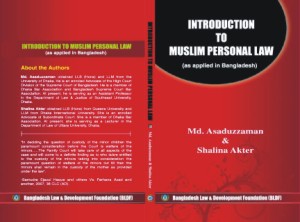Law book review
Book Review: Introduction to Muslim Personal Law (as applied in Bangladesh)
Orientation of Muslim Personal Law
Emdadul Haque
 BEING the learners of law whether it is personal law or other laws we often are to depend on Western and Indian law books. It is not because we are absolutely in dearth of resources persons to write books but due to lack of their interest to invest their valuable and profitable time of advocacy or consultancy. Many law books are treated as the Bible of some subjects. Of course, I am not dead against the western and Indian books but a bit cautious regarding conflicts of personal laws. For example if we try to follow any book on Hindu law of India we will be in struggle as our Hindu personal law is yet to be updated like India. Also language barrier is one of the major impediments for learners to understand foreign books. Considering these issues the recent published book on “Introduction to Muslim Personal Law” written by Md. Asaduzzaman and Shalina Akter is a simplified version basically designed for law students to orientate and understand them the basic notions of Muslim personal laws in Bangladesh. This book seems to be a developing literature in such field. In this book the statutory rationality of application of the Muslim personal law in Bangladesh, and other issues like sources of Muslim personal law, marriage, dower, divorce, maintenance, dissolution of marriage, guardianship and custody of minor, restitution of conjugal rights, Family Court, gift (hiba), will (wasiyat), waqf, pre-emption (shufa) have discussed in a very easy fashion along with few relevant and recent case references. The authors have also focused on the issue of Muslim personal law and uniform family code spotlighting on the Law Commission Report of our country published in 2005. But it seems that the inheritance chapter of the book could have been more detailed and exhaustive. Both authors are young academician with talents and rosy possibilities. The book is a pious effort to introduce the Islamic jurisprudence in a very lucid manner. People having interest in muslim law would find it useful as a ready reference.
BEING the learners of law whether it is personal law or other laws we often are to depend on Western and Indian law books. It is not because we are absolutely in dearth of resources persons to write books but due to lack of their interest to invest their valuable and profitable time of advocacy or consultancy. Many law books are treated as the Bible of some subjects. Of course, I am not dead against the western and Indian books but a bit cautious regarding conflicts of personal laws. For example if we try to follow any book on Hindu law of India we will be in struggle as our Hindu personal law is yet to be updated like India. Also language barrier is one of the major impediments for learners to understand foreign books. Considering these issues the recent published book on “Introduction to Muslim Personal Law” written by Md. Asaduzzaman and Shalina Akter is a simplified version basically designed for law students to orientate and understand them the basic notions of Muslim personal laws in Bangladesh. This book seems to be a developing literature in such field. In this book the statutory rationality of application of the Muslim personal law in Bangladesh, and other issues like sources of Muslim personal law, marriage, dower, divorce, maintenance, dissolution of marriage, guardianship and custody of minor, restitution of conjugal rights, Family Court, gift (hiba), will (wasiyat), waqf, pre-emption (shufa) have discussed in a very easy fashion along with few relevant and recent case references. The authors have also focused on the issue of Muslim personal law and uniform family code spotlighting on the Law Commission Report of our country published in 2005. But it seems that the inheritance chapter of the book could have been more detailed and exhaustive. Both authors are young academician with talents and rosy possibilities. The book is a pious effort to introduce the Islamic jurisprudence in a very lucid manner. People having interest in muslim law would find it useful as a ready reference.
Emdadul Haque is Lecturer, Dept. of Law and Justice, Southeast University.